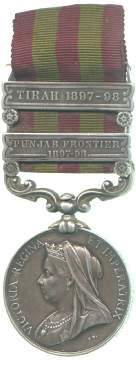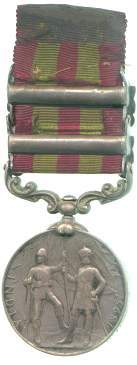Current Location: In storage
Maker(s)
Mint:
Calcutta
Artist:
Brock, Thomas
Artist:
Saulles, George W. de
Ruler:
Victoria (1837-1901)
Ruler:
Victoria regina et imperatrix
(With the title of)
Entities
Categories
Description
By 1895 it was beginning to be considered that the 23 bars issued to the India General Service Medal implied a need for its replacement, and in 1896 the new India Medal was first issued.
The North-West Frontier between British India and Afghanistan was a source of political tension for the length of the nineteenth century and beyond, as the precarious Imperial accommodations with local tribes required continual maintenance. In 1897 a particular crisis flared up when most of the Afridi tribes on the Punjab frontier, who had for sixteen years been receiving subsidies to guard the Khyber Pass, rebelled at the same time as the Mohmand tribes beyond the Pass began a raiding campaign.
Because of the number of men available to the Afridis and the stretched demands on British forces it was some time before a response could be coordinated, but towards the end of 1897 a campaign was begun, with one force proceeding to secure the forts around the city of Peshawar, and the other dealing with those in the Tirah area. The latter column, due to shortage of water and the extreme cold of this Himalayan region, ran into great difficulties and beat a fighting retreat, costly to both sides, until they could join forces with the Peshawar column. This combined force managed to secure the Khyber forts over Christmas 1897 and peace was secured the next year.
The bar for Punjab Frontier 1897-98 was awarded to all units involved in the campaign, but the retreat from Tirah was felt to merit a bar of its own. This medal bears both, and was awarded to Orderly Gunner R. D. Patch of the 9th Mountain Battery, Royal Artillery. Lester Watson acquired the medal at some point before 1928.
Notes
History note: Gift of L. Hoyt Watson; ex Lester Watson Collection, acquired before 1928
Legal notes
Given by Lester Watson through Cambridge in America, 2009
Measurements and weight
Diameter: 36.2 mm
Weight: 54.19 g
Acquisition and important dates
Method of acquisition: Given
(2009)
by
Watson, Lester
Dating
1896
-
1902
Materials used in production
Silver
Techniques used in production
Struck
Inscription or legends present
Inscription present: Bust of Victoria facing left
- Text: VICTORIA REGINA ET IMPERATRIX
- Location: Obverse
- Type: Design
Inscription present: British and Indian soldiers together holding a standard
- Location: Reverse
- Type: Design
References and bibliographic entries
Identification numbers
Accession number: CM.1268-2009
Primary reference Number: 141362
Watson Catalogue: 169
Ordering: M-0151
Previous object number: LW.0151
Stable URI
Audit data
Created: Saturday 6 August 2011
Updated: Monday 25 March 2024
Last processed: Wednesday 14 May 2025
Associated departments & institutions
Owner or interested party:
The Fitzwilliam Museum
Associated department:
Coins and Medals





